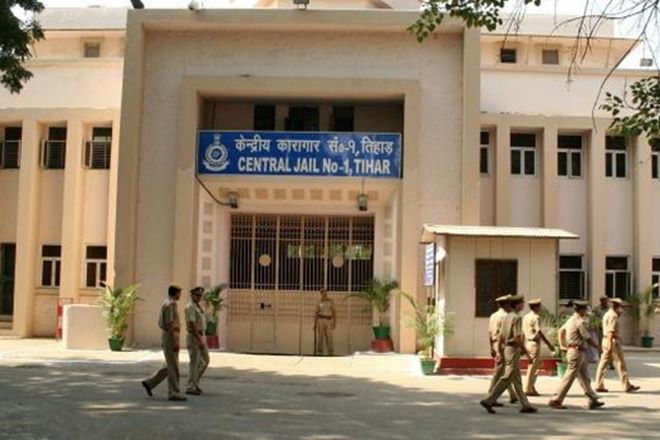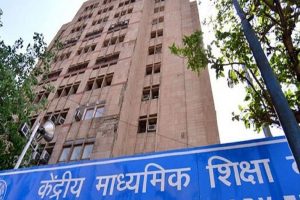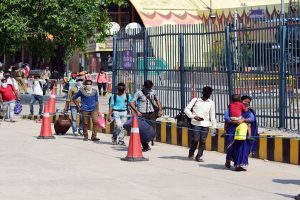A suo-moto petition was filed before the Supreme Court of India Contagion on COVID-19 Virus in prison. The matter was heard by the bench comprising of Hon’ble Chief Justice, Hon’ble Mr Justice Nageshwar Rao and Hon’ble Mr Justice Surya Kant.
SOCIAL DISTANCING ISSUE IN PRISON
The Government of India issued an advisory for social distancing as a must in order to prevent the spread of COVID-19. The apex court’s attention was attracted to overcrowded prisons.
There are 1339 prisons in this country, and approximately 4,66,084 inmates inhabit such prisons as recorded in the judgment. According to the National Crime Records Bureau, the occupancy rate of Indian prisons is at 117.6%. In states like Uttar Pradesh and Sikkim, the occupancy rate in jails is as high as 176.5% and 157.3% respectively. Information about types of 1391 jails is as below (Reference 1).
| Type of Jail | Number of Jails | Total Capacity | Occupancy Ratio | Details |
| Central Jails | 130 | 151421 | 121.2% | Jails that have a larger capacity than other jails with rehabilitation facilities. |
| District Jails | 346 | 126909 | 134.7% | They serve as the main prisons in states |
| Sub Jails | 780 | 46993 | 92.1% | Jails at the lower levels. |
| Women Jails | 19 | 4827 | 70.4% | Especially for Women. |
| Borstal Schools | 21 | 2438 | 50.2% | Set up to ensure care, welfare and rehabilitation of young offenders in a different environment suitable for children |
| Open Jails | 53 | 4316 | 70.1% | Prisoners with good behaviour satisfying certain norms prescribed in the prison rules are admitted in open prisons. Minimum security is kept in such prisons & prisoners are engaged in agricultural activities |
| Special Jails | 38 | 10490 | 60.1% | Any prison provided for the confinement of a particular class or particular classes of prisoner |
| Other Jails | 4 | 465 | 55.9% | NA |
| Total | 1391 | 347859 | 118.4% | NA |
The rate of ingress and egress in prisons is very high, especially since persons (accused, convicts, detenues etc.) are brought to the prisons on a daily basis. Apart from them, several correctional officers and other prison staff enter the prisons regularly, and so do visitors (kith and kin of prisoners) and lawyers. Therefore, there is a high risk of transmission of COVID-19 virus to the prison inmates. For the reasons mentioned above, prisons can become fertile breeding grounds for incubation of COVID-19.
The Hon’ble apex court was of the opinion that there is an imminent need to take steps on an urgent basis to prevent the contagion of COVID-19 virus in our prisons. The apex court was pleased to note that some State Governments and their Departments of Prisons have already taken preventive measures.
The Director-General of Prisons, Kerala has set up isolation cells within prisons across-Kerala. Those suffering from COVID-19 symptoms such as cold and fever are being moved to these isolation cells. All the new inmates who will be admitted to the prisons in Kerala will be isolated in the isolation cells in the admissions block for six days before permitting their entry into the regular prison cells.
An isolation ward has been set up in the Tihar Jail, Delhi and all the 17,500 inmates of the said Jail were checked for COVID-19, and it was found that none displayed any symptoms relating to COVID-19. The authorities of the Tihar Jail have also decided that new inmates will be screened and put in different wards for three days. However, the court did not have information about the measures taken by the other State Governments in their prisons to prevent the contagion of COVID-19 on the last date of hearing.
DIRECTIONS OF THE HON’BLE COURT
The petition was adjourned for March 23, 2020, with directions appropriate that notices be issued to show cause why directions should not be issued for dealing with the present health crisis and to suggest immediate measures which should be adopted for the medical assistance to the prisoners in all jails and the juveniles lodged in the Remand Homes and for protection of their health and welfare.
Taking into consideration the possibility of outside transmission, we direct that:
(a) The physical presence of all the undertrial prisoners before the Courts must be stopped forthwith and recourse to video conferencing must be taken for all purposes.
(b) The transfers of prisoners from one prison to another for routine reasons must not be resorted except for decongestion to ensure social distancing and medical assistance to an ill prisoner.
(c) There should not be any delay in shifting sick person to a Nodal Medical Institution in case of any possibility of infection is seen.
(d) Specific readiness and response plans must be developed in consultation with medical experts.
(e) A monitoring team must be set up at the state level to ensure that the directives issued with regard to prison and remand homes are being complied with scrupulously.
(f) Each State/Union Territory shall constitute a High Powered Committee comprising of:
(i) Chairman of the State Legal Services Committee,
(ii) the Principal Secretary (Home/Prison) by whatever designation is known as,
(ii) Director-General of Prison(s), to determine which class of prisoners can be released on parole or an interim bail for such period as may be thought appropriate.
For instance, the State/Union Territory could consider the release of prisoners who have been convicted or are undertrial for offences for which prescribed punishment is up to 7 years or less, with or without fine and the prisoner has been convicted for a lesser number of years than the maximum.
It is open for the High Powered Committee to determine the category of prisoners who should be released as aforesaid, depending upon the nature of the offence, the number of years to which he or she has been sentenced or the severity of the offence with which he/she is charged with and is facing trial or any other relevant factor, which the Committee may consider appropriate.
The Undertrial Review Committee contemplated by this Court In re Inhuman Conditions in 1382 Prisons, (2016) 3 SCC 700, shall meet every week and take such decision in consultation with the concerned authority as per the said judgment. The High Powered Committee shall take into account the directions contained in para no.11 in Arnesh Kumar v. the State of Bihar, (2014) 8 SCC 273.
References: 1.RAKESH DUBBUDU, Indian Prisons are Overcrowded & 2/3rd of the Inmates are Under Trials- https://factly.in/indian-prisons-are-overcrowded-23rd-of-the-inmates-are-under-trials/, April 25, 2015.













Add Comment